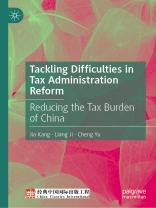This book explores China’s tax system- one of the largest in the world, it operates on a quite different logic in taxing income, property and capital gains compared with most other countries. In an effort to reduce income inequality and continue to drive robust growth, a lively debate about the reform of China’s tax system is taking place. In this book, some of China’s most prominent thinkers on the topic share their insights and proposals. This book will interest scholars of the Chinese economy, business analysts and scholars of taxation policy.
विषयसूची
Introduction.- Chapter I: Formation and Evolution of China’s Compound Tax System.- Chapter II: Overview of the Progress of Six Major Tasks of Tax Reform in Supporting Fiscal and Taxation Reform.- Chapter Ⅲ: Panorama of Tax Reduction, Negative Reduction and Related System Reform.- Chapter Ⅳ: ‘Hard Bones’ of Tax Reform: Gradually Increasing the Proportion of Direct Taxes and Building the Local Taxation System.- Conclusion.
लेखक के बारे में
Jia Kang is Ph.D. Advisor and Research Fellow at the Chinese Academy of Fiscal Sciences, Ministry of Finance of the People’s Republic of China and member of the National Committee of the CPPCC, and Chief Economist of the China Academy of New Supply-side Economics.
Liang Ji is Ph.D. Professor at the Chinese Academy of Fiscal Sciences. She has published 2 monographs and 10 co-authored books, and more than 100 academic papers in academic journals.
Cheng Yu is Ph.D. Professor at the Chinese Academy of Fiscal Sciences. She has published 3 monographs and 20 co-authored books, and more than 100 academic papers in academic journals.












